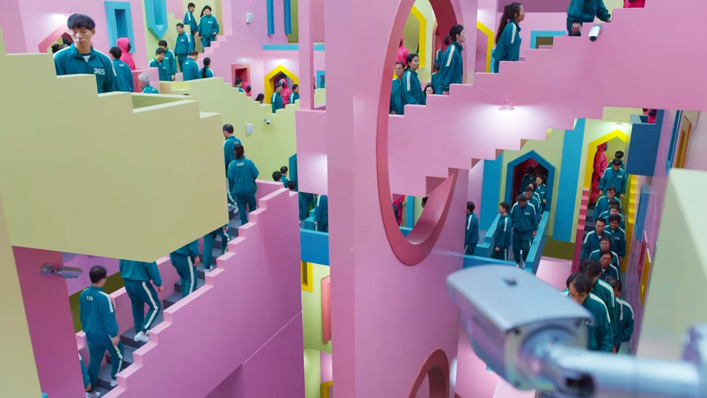The world’s obsessed with Netflix’s gnarly Squid Game – but does it live up to the hype?

Where did Squid Game come from, and why has it suddenly got its tentacles into TV obsessives everywhere? Luke Buckmaster unpacks the sadistic appeal of this overnight Netflix success story.
At the risk of sounding like an old man, Christ on a bike the zeitgeist moves fast these days. The first I heard of Squid Game was in a news article reporting that it had rapidly become Netflix’s most watched series of all time; weird shit happens when the role of determining cultural touchstones is outsourced to algorithms.
Not that, in this instance, the gremlins inside the Netflix homepage chose poorly. My initial assumption that audiences had flocked to some kind of colourful, squidgy, semi-violent game show was quickly superseded by the comforting realization that they had flocked to some kind of colourful, squidgy, semi-violent Korean scripted drama. Director Hwang Dong-hyuk’s kookily entertaining series follows in the bloodied footsteps of sadistic tournament movies—the arena of Battle Royale, The Running Man, The Hunger Games, Turkey Shoot—with a bouncy, pacey style that reminded me energy-wise of the work of legendary Ozploitation filmmaker Brian Trenchard-Smith.
Random people, including manchild gambling addict Seong Gi-hun (Lee Jung-jae) are selected to compete in a gnarly tournament for cash and survival, participating in events managed by a mysterious mastermind assisted by henchpeople in hooded red jumpsuits. It’s the Olympics of physical challenges, death machines and boobytrap-like situations, John Kramer presumably brought on as a creative consultant.
A key scene in the first episode involves a, shall we say, dramatic interpretation of the old primary school game “red light, green light”. Which involves—as your acid flashback to childhood may recall—running towards a finishing line once “green light!” is called then immediately pausing upon the declaration of “red light!” In the kids game, any participants still moving go back to the starting line; in this version adults get executed by a massive doll-like robot that fires bullets out of its eyes.
Them’s the rules and players have no right to whinge; they even get to vote on it. Survivors of ‘red light, green light’ are given a choice: vote to get out of this hell hole or vote to continue the tournament of death and doom—the eventual victor pocketing a very pretty penny. This leads to a debate about whether these people—the poor, the peasants, the plebeian—would prefer to deal with the bullshit out there or the bullshit inside. The point is made that in either instance, they’re rooted.
Squid Game is gnarly but the violence so far (I’ve watched the first four episodes) is fairly tame by my standards. Bearing in mind I am the sort of person who in the past has bought a ticket to a screening of a banned gay zombie porno, and am not completely averse to the idea of doing it again were the opportunity to arise (though for the record I didn’t like it).
Sprinkled among the grisly imagery are unpredictable splashes of visual bravado that take you by surprise, such as the three below shots, all from the first episode, which are lovely and weird and in close proximity running time-wise to violent mayhem. They lull you in with their pastel beauty, symmetrical and semi-symmetrical compositions (with whiffs of Wes Anderson and Jacques Tati) and trippy architecture.



Seong Gi-hun is a pitiable protagonist, reminding me of Adam Sandler from Uncut Gems, but even more desperate and pathetic: the sort of guy who gambles with a weird random man he meets on the train, and, instead of coughing up money, agrees to let this man repeatedly slap him in the face. At least Sandler only dealt with precious rocks and high stakes.
Squid Game continues a Netflix trend of turning foreign language acquisitions—with optional voice-over dubbing—into international hits, among them Spanish productions Money Heist and The Platform. Like these titles, Dong-hyuk’s series offers critique of capitalism in a happy kablamo! spirit—to help the highly explosive medicine go down. In Squid Game participants are selected not due to bad luck (like in Battle Royale and The Hunger Games) or as punishment for breaking the law (Turkey Shoot and The Running Man) but due to their poor socio-economic circumstances.
The plotting has a teasing quality, dipping us in and out of the action, instilling a desire to return to the thunderdome. If this were a film the structure would probably be much tighter, but the gaps between grotesque games help build anticipation for the next, and the wait makes the payoff greater.
So, why are people going crazy about this show? Not because it’s good (audiences often flock to crummy, zeitgeist-y titles) but that is an added benefit. To repeat my previous statement: algorithms make crazy shit happen. Then the hype machine works as it always has: those on the outside want in, to ‘see what all the fuss is about’. One algorithmic engagement leads to another, and another, and another, until suddenly, seemingly apropos of nothing, we’re all watching Ass—the movie depicted in Idiocracy consisting entirely of a single shot of a naked buttocks, occasionally farting.
At one point, according to this trajectory, we’ll look back at the good ol’ days, when our attention was procured by comparatively high art productions such as colourful, squidgy, semi-violent stories involving dystopian sporty sadism. That is the domain of Squid Game, and it’s good at what it does.



















